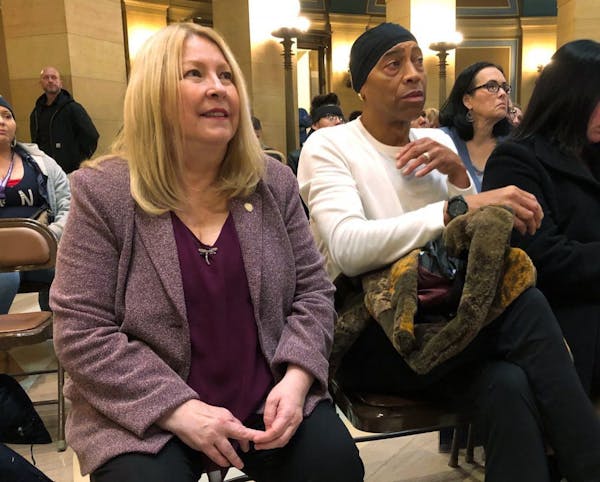Minnesota Attorney General Keith Ellison is naming members of the family behind opioid manufacturer Purdue Pharma in the state's ongoing lawsuit over marketing tactics that have been linked to a wave of addictions and overdose deaths across the country.
The move, announced on Friday, follows lawsuits in other states against the Sackler family, whose members are known nationally for their philanthropic giving and as the makers of the widely prescribed medication OxyContin.
"Their misconduct led directly to damage and death in every community in Minnesota," Ellison said. "They knew what they were doing, and they did it anyway. Today, we're holding them personally accountable for the harm they and their greed have done to the people of our state."
In a statement Friday, the Sackler family described the lawsuit as "baseless" and a "misguided attempt to place blame where it does not belong for a complex public health crisis."
"We strongly deny these allegations, which are inconsistent with the factual record, and will vigorously defend against them," the family said. "Solving this crisis will require collaboration and focus on the real problems our nation needs to address. Government data makes clear that the opioid crisis is growing rapidly because of illicit fentanyl smuggled in from China and Mexico — and headline-seeking lawsuits like this only distract from the important task of identifying real solutions to that crisis."
Purdue Pharma notched a legal win this week when a North Dakota judge dismissed that state's claim that the company minimized risks and inflated the benefits of long-term use of its narcotic painkillers. The judge found "holding Purdue solely responsible for the entire opioid epidemic in North Dakota is difficult especially given Purdue's small share of the overall market for lawful opioids."
North Dakota Attorney General Wayne Stenehjem said Friday he will appeal the ruling.
Minnesota originally filed suit last year against Purdue Pharma, the Sackler-founded company in Connecticut that created OxyContin. The litigation was modeled after successful efforts to sue tobacco companies, with the aim of using a judgment to fund addiction treatment.
The lawsuit is being watched closely by Minnesota lawmakers considering new fees on drugmakers and distributors to fund a $20 million-a-year state opioid addiction and prevention initiative.
DFL and Republican lawmakers remain at loggerheads over the fees, a standoff that has threatened to derail bipartisan opioid legislation in the closing days of the regular session, which is scheduled to end Monday.
Republicans in control of the Senate have proposed lowering the fees on companies after five years or if Minnesota wins a settlement of $150 million or more. A House DFL-backed version offered in negotiations would lower fees after 10 years, or after the state's fund hits $700 million in fees and settlement funds.
Ellison said Friday that he is seeking to add eight members of the Sackler family as individual defendants after finding that each played a role in allegedly deceptive marketing tactics "at a granular level."
According to Ellison, Sackler family members attended sales meetings and directed compensation of Purdue's sales force in ways that encouraged inappropriate opioid prescriptions. He added that the family knew of the addictive power of opioids as early as 1999 but dismissed and withheld such information for years.
Nearly every state is involved in litigation against companies tied to opioid production or distribution, with both state and federal officials increasingly trying to force Big Pharma to foot the bill for addiction treatment and prevention. In addition to the states' suits, a massive federal lawsuit involving 1,600 cities, counties, American Indian tribes and labor unions was consolidated last year in Ohio. Purdue Pharma is one of more than a dozen defendants named in that case.
Now, state attorneys general are increasingly trying to bring members of the Sackler family to account for their roles with Purdue Pharma. This week, Iowa, Kansas, Maryland, West Virginia and Wisconsin each announced new legal actions against Purdue Pharma, and all but Kansas targeted at least one member of the Sackler family. Minnesota's lawsuit would be one of the more extensive pieces of litigation against the family, with eight members named.
Purdue agreed with Oklahoma in March to a $270 million settlement out of court, staving off what would have been its first trial over the opioid epidemic. Sackler family members will personally pay $75 million of that total.
The nationwide litigation underscores the extent of Purdue's marketing reach: Ellison said Purdue sales representatives visited Minnesota prescribers more than 110,000 times between 2006 and 2017.
Stephen Montemayor • 612-673-1755 Twitter: @smontemayor

Want to share info with the Star Tribune? How to do it securely

'Safe recovery sites' would offer syringes, naloxone and more to people using drugs. The plan could be in peril.
New Minnesota GOP leaders seek peace with party's anti-establishment wing

Who is Republican Lisa Demuth, Minnesota's first House speaker of color?

